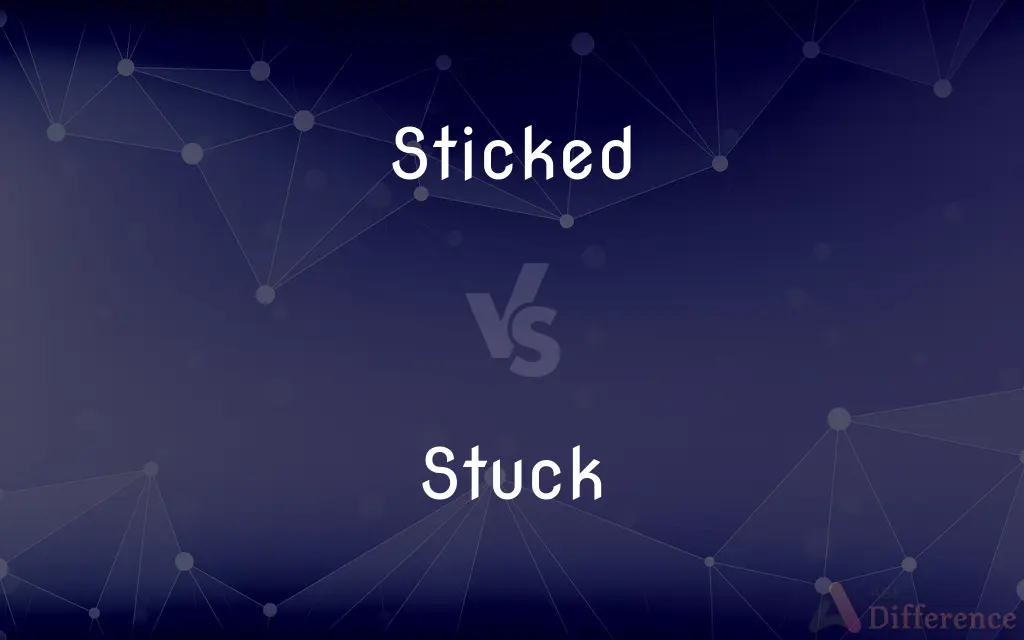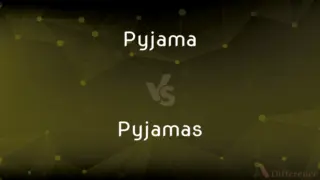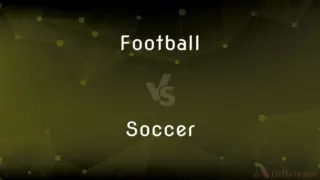Sticked vs. Stuck — What's the Difference?
By Fiza Rafique & Maham Liaqat — Updated on March 28, 2024
Sticked is rarely used and specific, often related to ice hockey, whereas stuck is the widely accepted past tense and past participle of "stick," used in various contexts.

Difference Between Sticked and Stuck
Table of Contents
ADVERTISEMENT
Key Differences
Sticked finds its use in very niche contexts, particularly in sports terminology like ice hockey, where it describes the action of using a stick in a specific manner. Whereas, stuck is the universal past tense and past participle form of the verb "stick," applicable in numerous situations where something adheres or becomes fixed to a surface or in a situation.
Sticked might be encountered in sports commentary or in the lexicon of players and fans, indicating a particular move or action. On the other hand, stuck is part of everyday language, describing objects that are attached to something else or people who are unable to move from a particular position or situation.
In terms of grammatical use, sticked is almost exclusively used in present tense forms, with its past form being highly specialized. Meanwhile, stuck serves as both the simple past and past participle form of "stick," functioning in a wide range of tenses and constructions.
The frequency of use also distinguishes these terms; sticked is seldom heard outside its specific context, making it a less recognized form. Conversely, stuck is a common term in English, familiar to speakers at all levels of proficiency and used regularly in both spoken and written forms.
The semantic range of sticked is narrow, closely tied to the action of using a stick in sports. Whereas, stuck carries a broad semantic range, covering physical adhesion, personal predicaments, and metaphorical applications, such as being "stuck in a rut."
ADVERTISEMENT
Comparison Chart
Use
Specific to actions in sports like ice hockey
General past tense/participle of "stick"
Context
Mainly sports
Wide range of contexts
Grammatical Role
Seldom used, mostly present tense
Past tense and past participle
Frequency
Rare, niche usage
Common in everyday language
Semantic Range
Narrow, specific actions
Broad, including physical and metaphorical uses
Compare with Definitions
Sticked
To push or move with a stick in sports.
He sticked the puck into the net during the game.
Stuck
Adhered to a surface.
The sticker stuck to the window despite the rain.
Sticked
Relates to maneuvering with a stick.
She sticked her way through the defense with skill.
Stuck
Remained firm in a place or position.
The memory stuck in his mind for years.
Sticked
Specific action or technique.
Sticked correctly, the move can dominate the game.
Stuck
In a difficult situation.
I'm stuck on this math problem and need help.
Sticked
Mainly used in ice hockey terminology.
The player sticked the ball away from the opponent.
Stuck
Unable to progress.
The project is stuck at the planning stage.
Sticked
(Seldom used) Past tense of stick in specific jargon.
He sticked his claim on the team roster with impressive plays.
Stuck
Unable to move from a position.
The car stuck in the mud couldn't be moved.
Sticked
Past tense and past participle of stick.
Stuck
Past tense and past participle of stick.
Sticked
(Printing)Past tense and past participle of stick.
Stuck
Unable to move.
Can you shift this gate? I think it’s stuck.
If you’ve had to battle a stuck zipper, you know how frustrating it can be.
Sticked
Simple past tense and past participle of stickstill used in some senses, archaic in others.
Stuck
Unable to progress with a task.
I’m totally stuck on this question in the test.
Sticked
Stuck.
And in the sand her ship sticked so fast.
They sticked not to give their bodies to be burnt.
Stuck
No longer functioning, frozen up, frozen.
There are several ways to close a stuck program.
Stuck
In the situation of having no money.
Stuck
(obsolete) A thrust.
Stuck
A thrust.
Stuck
Caught or fixed;
Stuck in the mud
Stuck
Baffled;
This problem has me completely stuck
Common Curiosities
Is "stuck" applicable only to physical situations?
No, "stuck" can describe physical, emotional, and metaphorical situations.
Can "stuck" be used in all tenses?
Yes, as the past tense and past participle of "stick," it's used across various tenses.
What is the primary context for using "sticked"?
Sticked is primarily used in sports contexts, particularly in ice hockey.
How often is "sticked" used compared to "stuck"?
"Sticked" is rarely used, while "stuck" is common in everyday language.
Are there any sports where "sticked" is not appropriate?
Yes, "sticked" is specific to certain sports like ice hockey and not used broadly.
What is an example of "stuck" in a non-physical context?
Being "stuck in a rut" describes a non-physical state of stagnation.
What does "stuck" imply in a mechanical context?
It implies that a part is immobilized and cannot move or function as intended.
Is there a common mistake with using "sticked" and "stuck"?
Yes, mistakenly using "sticked" instead of "stuck" outside of its sports context.
Can "stuck" describe emotional states?
Yes, one can feel "stuck" in an emotion or situation.
Is it correct to say "sticked to a routine"?
No, the correct term would be "stuck to a routine."
Can "sticked" be used in everyday language?
No, sticked is very niche and not used in general language.
How does one choose between "sticked" and "stuck"?
The choice depends on the context: "sticked" for specific sports actions, "stuck" for general use.
How does the usage of "stuck" vary in literature?
In literature, "stuck" can symbolize emotional or situational paralysis.
Is "sticked" a formal term?
It's formal within its specific sports context but not in general use.
Can "sticked" be used to describe past events outside of sports?
No, its use is confined to specific actions in sports contexts.
Share Your Discovery

Previous Comparison
Pyjama vs. Pyjamas
Next Comparison
Football vs. SoccerAuthor Spotlight
Written by
Fiza RafiqueFiza Rafique is a skilled content writer at AskDifference.com, where she meticulously refines and enhances written pieces. Drawing from her vast editorial expertise, Fiza ensures clarity, accuracy, and precision in every article. Passionate about language, she continually seeks to elevate the quality of content for readers worldwide.
Co-written by
Maham Liaqat













































